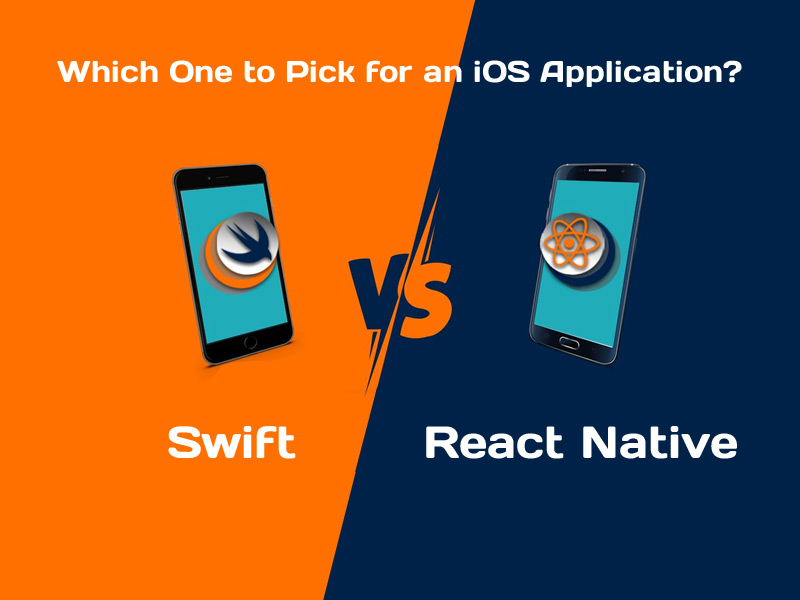With the announcement of the newly updated iPhone’s iOS 16, iOS app developers have fallen into a frenzy. Every year, a new iPhone is launched, which initiates the transition of more and more people from other smartphone operating systems to iOS. This huge shift makes it important for iOS app developers to consistently improve their technology and techniques. This is why today we are going to address a debatable issue that has caused a split among iOS developers in this blog by EitBiz. Swift vs React Native for iOS app development? This issue has been the reason for the divide between iOS developers, and we are going to end it once and for all. EitBiz is one of the most credible Information & Technology companies out there, with a deeper and great insight into the tech world.
After reading this blog, you will have a better idea of which one you should pick for your iOS application’s development.
But before we begin comparing the two, let’s try to understand them completely and go over the advantages and disadvantages that come with both.
What is Swift?

Originally formed to replace Objective-C, Swift has now made creating iOS applications way easier. Swift is a programming language released in 2014 with the sole purpose of getting rid of Objective-C. Swift has now made the process of creating code much more convenient with zero drawbacks. It is an effective programming language that strives to give developers more freedom than ever while developing.
What is React Native?

React Native has been widely used as a tool to build complex cross-platform applications. Supported by Meta, React is a Javascript framework that allows users to share the code across various platforms, including Android, iOS, and web apps. React is highly recommended for those looking to get a large-scale application developed. The framework uses native UI elements to enable the development of multi-platform Android and iOS applications.
Advantages of Using Swift
Now that we have a better understanding of the Apple-made programming language, it is time to go over some of the advantages and disadvantages that this programming language brings to the table.
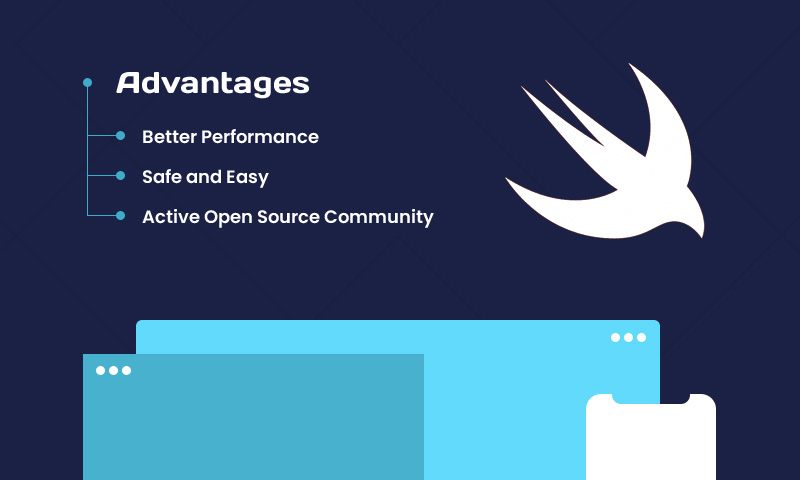
Better Performance:
Swift was originally released to fill the gaps that Objective-C couldn’t and take its place. Gradually, it started dominating the iOS development industry because of its flexibility. This substantiates the fact that Swift provides better performance while developing than other programming languages. Swift allows the code to be reused and shared while being utilized for both back-end and front-end development. This makes the process effortless and speeds up the development.
Safe and Easy:
While renovating or expanding large-scale projects, the developer can use Swift along with Objective-C as they are compatible with each other. The developer can use this to their advantage, making the process safer and easier.
Active Open Source Community:
Due to the persistent corporate support from Apple, Swift has one of the most active open source communities. Even though the programming language is new as compared to the others, there are a great number of resources available to developers.
Disadvantages of Using Swift
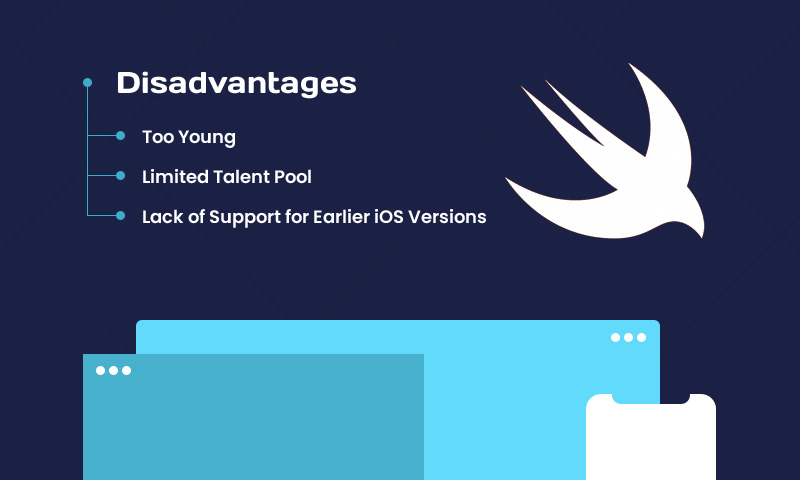
Lack of Support for Earlier iOS Versions:
Although it is not much of a problem because it is rare to see someone using an Apple device with an iOS version older than iOS 7, it still shows that Swift is still far from perfect.
Too Young:
One of the main reasons why some iOS developers refrain from using this programming language for large-scale projects is that it is still deemed “too young” by many developers.
Limited Talent Pool:
Despite the fact that the community of Swift developers is growing rapidly, reports from a recent Stackoverflow Developer survey show that only 6.4% of 64,000 respondents use Swift.
Advantages of Using React Native
Now that you are familiar with the advantages and disadvantages of using Swift, it is time to have a look at what React Native has to offer its users and iOS developers.
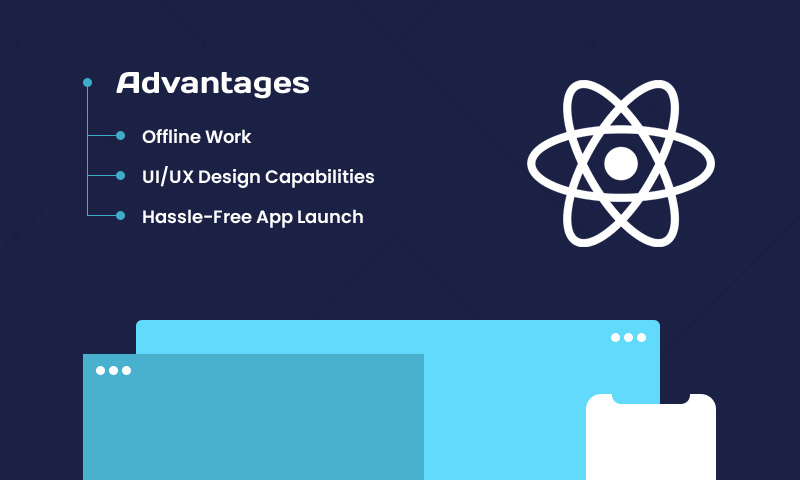
Offline Work:
One of the best things about React Native is that it can be used even without an internet connection. Although you would be required to have a stable internet connection to save the changes you made, it is not necessary to have a stable internet connection to access the web frameworks.
UI/UX Design Capabilities:
React Native has access to great UI/UX design elements and modern animation, which can help in delivering an amazing user experience to the end customer.
Hassle-Free App Launch:
React Native abides by all the requisite operating system guidelines, which makes it easier to launch on the Play Store or App Store once it has been developed.
Disadvantages of Using React Native
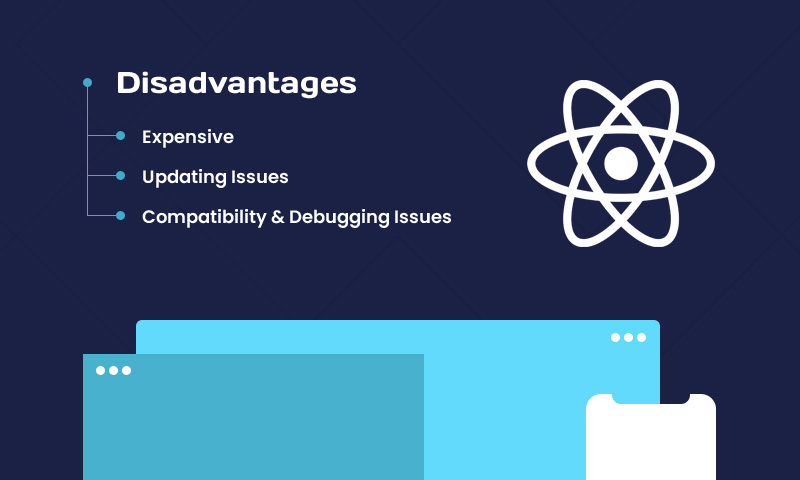
Expensive:
One of the main cons of React Native is that it is very high-end. It can get quite difficult for start-ups to afford React Native application development because of how expensive it is.
Updating Issues:
There have been many updating issues reported by people while using applications optimized through React Native. Updating the React Native versions is a complex issue in many cases.
Compatibility & Debugging Issues:
Another issue with React Native is that debugging bugs is usually a complex and difficult process. Since the applications are built using Java, C/C++, JavaScript, etc.
Difference Between Swift and React Native?
If we look closely at the features of the two programming languages, it can be clearly seen that both have significant and obvious differences. On the one hand, Swift has been developed by Apple and is only designed to develop iOS applications. On the other hand, React Native is supported by Meta and can carry out cross-platform application development. Besides that, Swift has been deemed cost-effective by a lot of developers, whereas React Native has been said to be a little expensive.
Which is Better for iOS App Development?
Both Swift and React Native are extraordinary programming languages and have been used to develop countless applications. But when we compare the two to decide which one is programming languages better for iOS app development, React Native doesn’t have a chance.
Why?
Because of the following reasons:
- Specialty:– One of the main reasons why React Native can eat Swift’s dust, is due to Swift specifically being designed to develop iOS mobile applications by Apple itself.
- Cost:– Another reason why Swift surpasses React Native is that it is more cost-effective and less expensive than React.
- Process:– The speed and smoothness of the development process matter a lot when it comes to iOS application development. Just like its name suggests, through Swift, developers swiftly carry out the development process.
Conclusion
These were a few reasons why Swift is way ahead in iOS app development than React Native despite being new and not having a large community like React Native.
